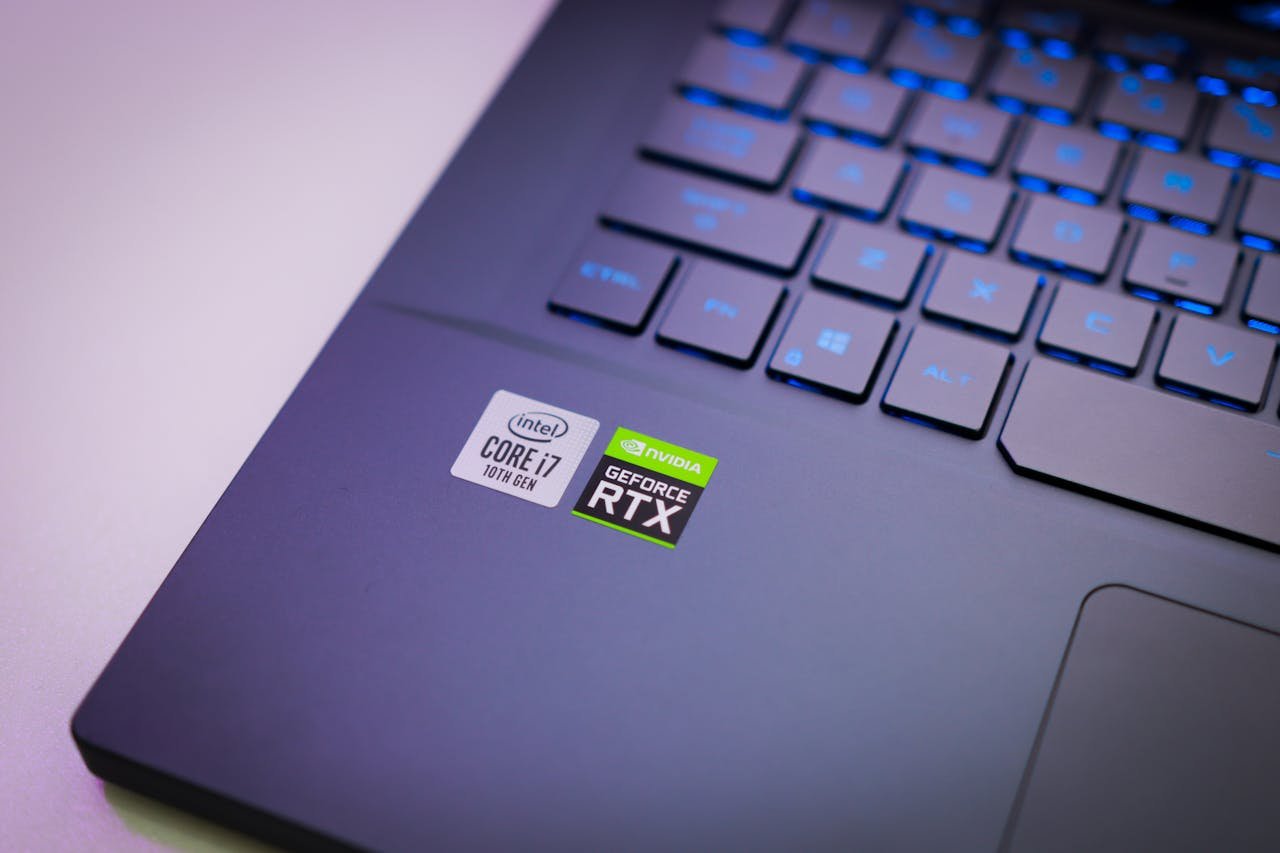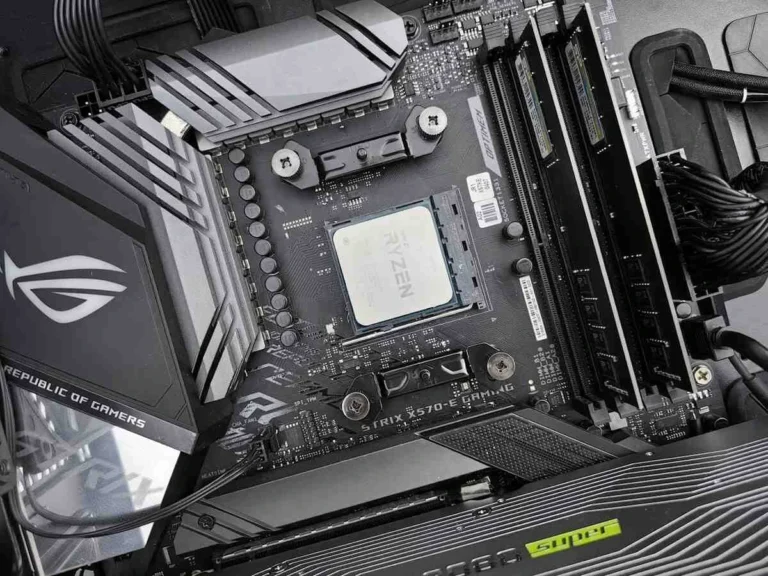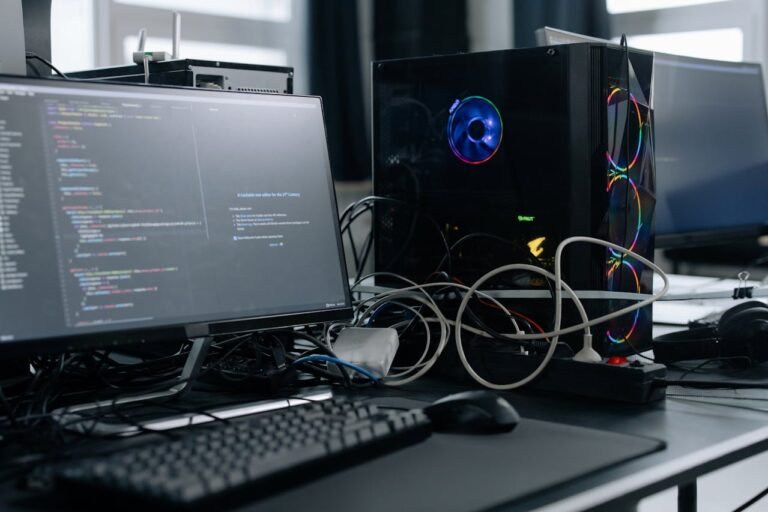When it comes to gaming, the first thing most people think about is whether they need a dedicated GPU. However, with advancements in integrated GPUs, this question has become more relevant than ever.
So, do you really need a dedicated GPU to enjoy gaming?
Let’s face it, integrated GPUs have come a long way. Processors like Ryzen 8000G and Intel Arc offer enough power to run a surprising range of games.
Sure, they may not deliver the same performance as a high-end NVIDIA or AMD graphics card, but for many gamers, the trade-offs are worth it.
If you’re into budget gaming or prefer to play casual titles at 1080p, an integrated GPU can get the job done without breaking the bank.
Plus, they offer greater power efficiency, which is a huge bonus for laptops and low-power desktops. This makes them a solid choice for gamers who want something affordable but still capable of handling modern games.
That said, there are some performance trade-offs. Integrated GPUs might struggle with newer AAA titles at higher settings, but for lighter games or indie titles, they’re more than enough.
So, can integrated graphics handle the latest games?
The answer depends on your gaming needs. If you’re after the best value and don’t mind dialing down a few settings, integrated GPUs could be exactly what you’re looking for.
Table of Contents
Integrated GPUs in Modern Gaming: What to Expect?
Integrated GPUs have come a long way in recent years, thanks to innovations like Intel Arc and Ryzen 8000G. In the past, integrated GPUs struggled to deliver consistent gaming performance, especially with modern titles.
But today, they’ve evolved to handle more demanding tasks and provide a better overall experience for gamers.
Older models of integrated GPUs had limited processing power, often leading to lag or frame rate drops, especially in graphically demanding games.
However, the latest versions have seen significant improvements in both performance and efficiency.
For example, the Ryzen 8000G delivers much higher frame rates and can handle 1080p gaming without the major slowdowns that plagued previous generations.
Similarly, Intel Arc offers a decent blend of power efficiency and gaming capabilities, closing the gap between integrated and dedicated GPUs for casual gaming needs.
These advancements make modern integrated GPUs more than just budget-friendly solutions—they’re now capable of running many popular games with reasonable performance, making them a solid option for gamers who don’t need top-of-the-line specs.
Which Types of Games Are Integrated GPUs Best Suited For?
Integrated GPUs shine in indie games, low-spec titles, and competitive esports games. These types of games typically don’t require the heavy-duty processing power that AAA titles do, making them a perfect match for integrated GPUs. Games like Fortnite, Rocket League, and League of Legends run smoothly on integrated GPUs, especially when played at 1080p resolution with lower or medium settings.

Subtitle for This Block
Text for This Block
For casual gamers who don’t need ultra-high graphics or 4K resolution, integrated GPUs provide a seamless and enjoyable experience. These GPUs can easily handle multiplayer games, strategy titles, and even some mid-range games, as long as you’re willing to adjust the settings.
Example: Games like Fortnite and Rocket League perform well with integrated GPUs, especially at lower settings, making them ideal for budget-friendly gaming rigs.
Whether you’re playing less graphically intense games or don’t mind lowering the settings a bit, integrated GPUs are more than enough to deliver a smooth gaming experience.
Gaming Performance: Benchmarks and Real-World Tests
Gaming performance is often the deciding factor between an integrated GPU and a dedicated GPU.
In this section, we’ll dive into benchmarks and real-world tests to see how integrated GPUs stack up in popular gaming scenarios.
Integrated GPU Gaming Benchmarks: How Do They Stack Up?
When it comes to gaming performance, modern integrated GPUs have come a long way. For popular titles at varying settings—low, medium, and high—integrated GPUs like the Ryzen 8000G and Intel Arc are capable of running games with surprisingly smooth results.
For example, in benchmarks using the Ryzen 8000G, titles like Fortnite and Rocket League ran at a steady 60 FPS on medium settings at 1080p, offering a satisfying gaming experience.
Similarly, Intel Arc managed 50-55 FPS for Overwatch and Valorant on medium settings, showing how these GPUs can handle competitive games well.
Of course, if you crank the settings up to high or ultra, performance tends to drop, especially with more demanding AAA games.
However, for casual or mid-range gaming, integrated GPUs provide impressive results at lower settings, making them a great option for gamers who don’t want to invest in a dedicated GPU.
Real-World Gaming Scenarios: How Integrated GPUs Handle Popular Titles
Let’s talk about real-world gameplay. How do integrated GPUs fare when put to the test with popular titles like Call of Duty or The Witcher 3?

Subtitle for This Block
Title for This Block
Text for This Block
When tested with integrated GPUs, AAA games like Call of Duty: Warzone can still run, but typically at low settings and 720p resolution to maintain playable FPS. For instance, on a Ryzen 8000G, Call of Duty reached around 40 FPS at lower settings, while The Witcher 3 managed 30 FPS at medium settings.
While these numbers don’t match what you’d get with a dedicated GPU, they’re still quite playable if you’re willing to compromise on settings. For less intensive games or older AAA titles, integrated GPUs like Intel Arc or Ryzen APUs can deliver a decent experience, proving that you can still game on a budget.
So, is an integrated graphics card good enough for gaming? For casual titles or medium-level performance, absolutely. If you’re aiming for ultra graphics on the latest AAA titles, you might need to look elsewhere.
Power Efficiency and Heat Management: Why It Matters?
When it comes to gaming, power efficiency and heat management are crucial, especially for laptops and compact systems.
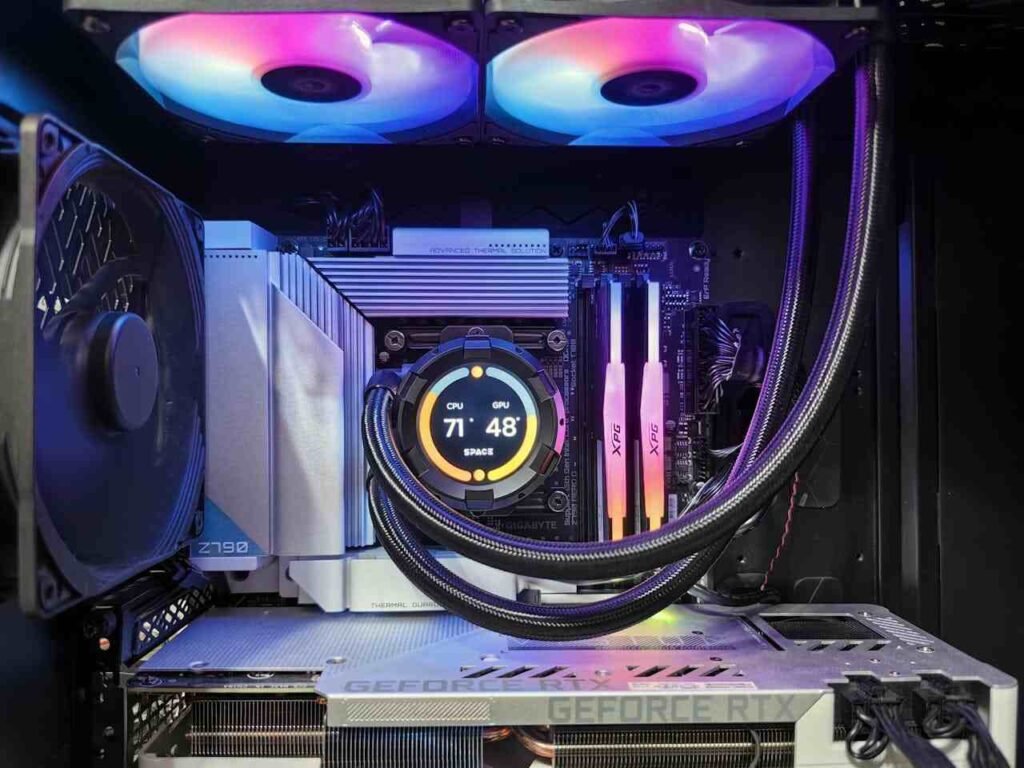
In this section, we’ll explore how integrated GPUs excel in these areas compared to dedicated GPUs and why it makes a big difference for long-term performance.
Power Efficiency of Integrated GPUs vs. Dedicated GPUs
Integrated GPUs have a significant edge when it comes to power efficiency, particularly in laptops. Here’s why:
- Lower Power Consumption: Since integrated GPUs are part of the CPU, they share resources and draw less power than dedicated GPUs.
- Extended Battery Life: Laptops with integrated GPUs, like Intel’s laptop series, offer a longer battery life during gaming than systems with standalone GPUs.
- Ideal for Gaming on the Go: If you’re a gamer who prefers mobility, integrated GPUs let you play longer without needing to recharge as frequently.
Example: Integrated GPUs, like the ones in Intel’s laptop series, offer a much longer battery life during gaming sessions compared to systems with a dedicated GPU.
Do Integrated GPUs Overheat?
Overheating is a common worry for gamers, but with integrated GPUs, the risk is generally lower. Here’s why:
- Efficient Heat Management: Integrated GPUs produce less heat since they share components with the CPU, making it easier to maintain optimal temperature ranges during extended use.. This reduces the strain on cooling systems.
- Balanced Workload: Systems like Intel Arc or Ryzen 8000G spread the workload across the CPU and GPU, leading to lower overall temperatures.
- Cooler Gaming Sessions: These systems can handle extended gaming sessions without excessive heat buildup, making them suitable for laptops with compact cooling setups.
Tip: Even though integrated GPUs manage heat well, it’s essential to ensure your gaming laptop has good airflow to prevent overheating during long gaming sessions.
Budget-Friendly Gaming: Is an Integrated GPU a Good Deal?
If you’re a gamer on a budget, choosing an integrated GPU can be a smart way to save money without sacrificing too much on performance.
In this section, we’ll look at the cost savings and value that integrated GPUs bring to the table for those seeking an affordable gaming setup.
How Much Can You Save with Integrated Graphics?
One of the biggest advantages of choosing an integrated GPU is the cost savings. With an integrated GPU, you’re not just saving on the upfront cost of a dedicated GPU but also benefiting from lower power consumption in the long term.
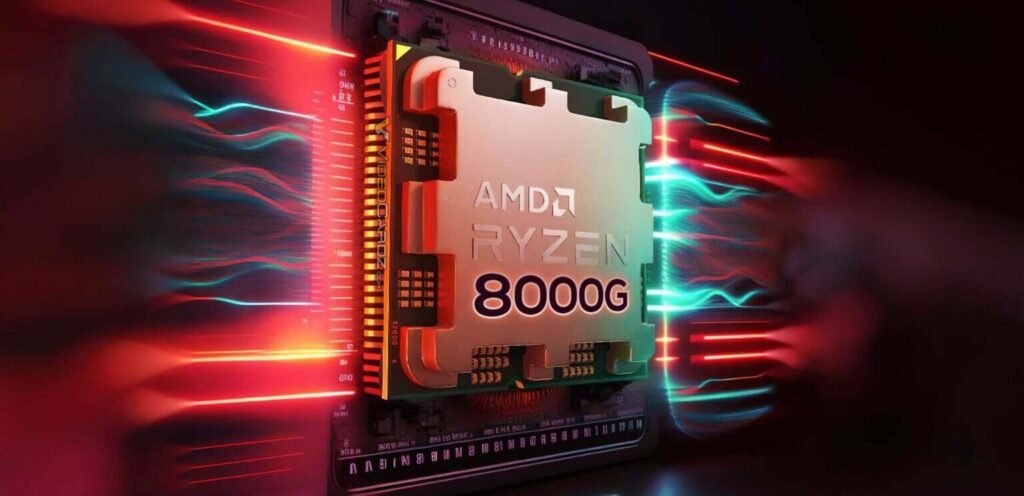
- Lower System Cost: A gaming PC with an integrated GPU—like the Ryzen 8000G—costs significantly less than a system with a dedicated GPU. You can expect to save hundreds of dollars by opting for a system that doesn’t require expensive, standalone graphics hardware.
- Energy Savings: Integrated GPUs are more power-efficient, which means your system will draw less energy over time, leading to lower electricity bills.
- Long-Term Value: For casual gamers or those who don’t need ultra-high settings, integrated GPUs offer a great balance of performance and affordability.
Example: “A gaming PC with a Ryzen 8000G processor costs significantly less than a similar system with a discrete GPU, making it an ideal choice for budget gamers.”
Best Budget Laptops with Integrated GPUs for Gaming
If you’re in the market for a budget gaming laptop, there are several models equipped with integrated GPUs that deliver solid performance without breaking the bank.

- Intel NUC: Intel NUC, or Next Unit of Computing, is a line of small, powerful computers that are designed to be compact and versatile. This compact, affordable gaming laptop offers great value with its Intel-integrated graphics, perfect for casual gamers.
- Ryzen 7 Pro: A powerful option that includes a Ryzen APU, offering both CPU and GPU performance in one package. It’s ideal for gamers looking for a budget-friendly, all-in-one solution.
- HP Pavilion Series: Known for affordability, this series offers laptops with integrated GPUs that can handle 1080p gaming on popular titles like Fortnite and Rocket League.
These laptops are great options for anyone looking to game on a budget without sacrificing too much on performance.
Integrated GPUs for 4K and VR Gaming: Can They Handle It?
As gaming technology advances, the demand for 4K and VR gaming has skyrocketed. But can integrated GPUs keep up with these high-performance requirements?

In this section, we’ll explore the limitations of integrated GPUs for 4K and VR and whether they can deliver a satisfying experience for gamers.
Can You Really Play in 4K or VR with an Integrated GPU?
While integrated GPUs have made significant strides in recent years, there are still limitations when it comes to 4K and VR gaming.
These high-end gaming experiences require a tremendous amount of graphics processing power, which integrated GPUs typically struggle to deliver consistently.
- 4K Gaming: While integrated GPUs can handle 1080p gaming quite well, pushing for 4K will likely result in performance drops, including lower frame rates and visual stuttering. For instance, integrated GPUs like the Ryzen 8000G or Intel Arc can manage lighter games at lower resolutions, but 4K gaming typically requires the power of a dedicated GPU to maintain smooth gameplay.
- VR Gaming: The story is similar to virtual reality. VR requires stable, high frame rates to avoid motion sickness and ensure smooth interactions. Integrated GPUs can run basic VR applications, but for a fully immersive experience, a dedicated GPU is often necessary.
Example: Integrated GPUs can manage 1080p games just fine, but pushing for 4K will likely result in performance drops, especially with more graphically intense titles.
While integrated GPUs offer a lot for the price, serious 4K and VR gamers will likely need to invest in more powerful hardware to get the best experience.
Should You Choose an Integrated GPU for Gaming?
So, is an integrated GPU the right choice for you? It depends on your gaming needs. If you’re a casual gamer who enjoys indie titles, esports, or playing at 1080p, then an integrated GPU is likely more than enough to meet your needs. They’re cost-effective, power-efficient, and handle a surprising number of games well.
However, if you’re someone who craves high-end graphics or plans to play the latest AAA titles at ultra settings or in 4K, then you may want to consider a dedicated GPU for the best performance. Integrated GPUs, while improving, still have limitations when it comes to 4K or VR gaming.
Ask yourself:
- Are you mainly playing casual or older games?
- Or do you need your system to handle the most graphically intense games out there?
By weighing the pros and cons—from performance and power efficiency to budget—you can make the best choice for your gaming setup.
FAQs
In 2024, integrated GPUs have become more capable than ever before, handling a wide range of games at 1080p resolution. With advancements in Intel Arc and Ryzen 8000G processors, integrated GPUs can run casual games, esports titles, and even some older AAA games at medium settings.
While they may not offer the high-end performance of dedicated GPUs, integrated GPUs are a fantastic option for budget-conscious gamers who don’t need ultra-high settings. Whether you’re building an affordable gaming setup or prefer a laptop with longer battery life, integrated GPUs provide solid gaming experiences for a majority of players.
Yes, integrated GPUs can work alongside dedicated GPUs in certain setups, especially in hybrid GPU systems. Many laptops and desktops are designed to use both integrated and dedicated GPUs, switching between them based on performance needs. For example, you might use the integrated GPU for light tasks like browsing or streaming, and the dedicated GPU for gaming or demanding graphic work.
This setup, often referred to as a hybrid GPU system, optimizes power usage and performance by choosing the right GPU for the task. It’s a smart way to extend battery life without sacrificing high-end performance when you need it.

